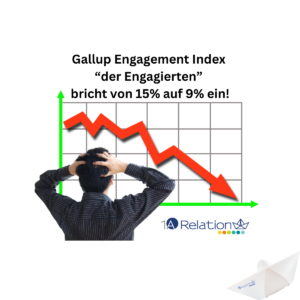Even we cannot provide a reliable recommendation without a thorough analysis and comparison. The requirements for a CRM system are simply too specific for that. Receiving a recommendation after a 5-minute conversation is something some CEOs would like, but we reject such requests. It is simply not possible to make an investment decision based on two or three sentences of description or a one-page briefing. A comparison of the software provides a much better basis for decision-making.
Especially when this investment in a CRM system is of strategic importance to your company. Not to mention the costs of the CRM software itself, which typically constitute a large part of the annual budget for the next few years.
A CRM system is a tool that you and your employees will use at all times. Some employees use the CRM software all day, five days a week. Therefore, more than just a few sentences of information are needed. The specifics of a CRM solution should be well described, and the requirements catalog should be thoroughly formulated. A well-done comparison transparently presents the differences. We also comment on important details that make the difference. Even in a small consultation, the key points for marketing and sales are crucial information for us.
Are system decisions made “John Wayne style” sensible?
A decision made “John Wayne style” (i.e., “shooting from the hip”), especially by small businesses, is not sensible. The usual suspect CRM software manufacturers like Salesforce, Microsoft Dynamics CRM, SugarCRM, Adobe/Marketo, and HubSpot are not always the best CRM software. The long-term consequences of such a decision are far too significant. Our client always receives a comparison of three or four suitable products or a comparison of entire CRM systems. The long list often includes six to eight manufacturers.
Therefore, a detailed CRM software selection and comparison are important.
Or put another way: It’s much more enjoyable when the CRM software optimally supports you at work. The tools, or “the knife must be sharp,” can become a work of art. Satisfying the customer is an art. That is the goal, nothing else. Using blunt tools—hence an inappropriate CRM software—is just torture.
Therefore, the general analyses provided by analysts are worthless for the individual. For us, these comparisons are worth a look to see how others view certain developments. But they are not suitable for making an investment decision for a CRM solution. The customer of Gartner is not the user of a company, but the provider. That is a subtle difference.
How do you find the right CRM software or the perfect CRM system that fits your processes and culture?
How do CRM software manufacturers usually present themselves to a company?
In most cases, initially well—the CRM software providers naturally highlight only the advantages of their CRM system. They promise the searching user an easy and successful change in customer approach.
But we now know the good as well as the less good sides of CRM software. Therefore, we can ask or select the right questions depending on the challenges that are important. We know how to test CRM functions. Which use cases play a role for you? And reveal the strengths and weaknesses with your examples.
A very popular criteria list of ours can be found here. It serves as a good, first entry point. In total, we have an overview of over 150 possible criteria.
What are typical questions to ask during the comparison?
Do you, as a medium-sized company, need a CRM solution provider with solid expertise in your specific industry? Or does an industry-neutral product better meet your CRM requirements?
In other words: Which CRM software best addresses the individual conditions and processes of your company or your employees? And: How is it ensured that the CRM software can be implemented without major problems and works harmoniously with both the technical possibilities and other systems? What support is offered during the implementation, introduction phase, and ongoing operation? Which existing tools can the CRM be docked to?
What tools can marketing use? Is there email integration? What is offered for sales or service? What benefits does the customer gain? What kind of customer experience does the customer feel?
Regardless of whether it is a small, medium-sized, or large company, a successful CRM implementation is an important step for better processes, growth, cost efficiency, and company management.
It is crucial whether the company opts for an “All-in-One” or “Best-of-breed” CRM software.
How do you know if a CRM system fits your company or not?
We simplify the selection process and help you get an initial, neutral overview of CRM software selection. Also with the first German CRM Landscape! The first overview of CRM software and CRM systems—only for the German-speaking region.
In the past few years, we have carried out over 100 projects on software selection, software implementation, and software use and application. The goal was always to define and create a CRM system or even an IT infrastructure that will remain valid for several years. It was also about ensuring that a solution has building blocks that do not become a blockade with changing requirements and business model adjustments. For years and nowadays, we must ensure in consulting that the solution fits your business and can adapt to your requirements. Even in 2-3 years.
Do you want more information for your project? Simply refer to our further information in the box on the right!
It is not just about CRM; it is also about analytical CRM, CRM programs, campaign management, or customer loyalty programs.
Even for small start-ups, a CRM software selection involves several steps that we carry out within our CRM consulting. Each project is individually designed. You benefit from our experience in selecting IT systems. We have also successfully implemented an ERP system. Whether marketing or sales requirements, the core question is always: What must the software be able to do? What does the IT infrastructure look like? Are there concrete, clear goals? What goals does the company have? What does the big picture look like? What must the software be able to do?
Success in Customer Relationship Management (CRM) is not just about acquiring software. It is also about the strategy. Success factors also include address and data quality. Training the employees and ongoing practice are crucial for success.
What functions and integrations should be considered?
What are typical functions and integration topics of a CRM software solution?
Email integration
A frequently requested topic is email integration. It is important to distinguish whether we are talking about Outlook integration or email marketing. Outlook integration is a very important integration for daily work. Incoming emails are assigned to the CRM account based on the sender’s email address. This can be done automatically or manually. We recommend automatic assignment.
Integration with an email provider is important for email campaigns and transactional emails. From which server are the emails sent? From the Exchange server or a dedicated email marketing server? Because with mass sending from the Exchange server, there is a risk of being branded as a spam sender.
Does the CRM provider or the email tool provider offer email templates that can be easily adapted to needs (structure, layout, etc.)?
Products like Hubspot CRM or Zoho CRM offer such integrations right in the starter package.
ERP software
CRM applications must be seamlessly integrated with the ERP system. Only then can both systems fully unfold their effectiveness. Processes are optimally supported. We have dedicated a separate landscape to this topic. Especially for smaller companies, the question arises: Buy the CRM separately from the ERP and connect them? Or better to buy an all-in-one ERP/CRM solution and accept average performance in some modules?
Both tools are usually applied throughout the company. One more in the commercial and administrative area, the other more in marketing, service, and sales. Only when both work together does the entire company benefit.
A comparison reveals the possibilities and weaknesses here. In the long run, the perfect mix is always better and cheaper.
Integration of Social CRM into the system
Is Social CRM important? How can social media integration look in a CRM system? Are tools like SnapAddy helpful? Nimble, Salesforce, and SugarCRM have long focused on this topic. What is compatible with DSGVO or GDPR? Not all social networks are easily integrated. Unfortunately, for example, XING has rejected all direct integrations (as of 05.06.2020). LinkedIn is currently a bit more lenient.
Integration of e-commerce into CRM tools
Can online shop providers be directly connected to the CRM? Plan a bi-directional interface for this. It is worth it. Transferring current information from the CRM to the web shop and transferring registrations or reactions from the web shop directly to the CRM is very important for users in customer management (campaigns, reports, etc.).
What other add-ons or building blocks are there?
Business Intelligence (BI), configurators (CPQ), archive and document management systems, Office integration from GSuite or Microsoft Office 365, Excel or other plug-ins.
CRM software selection only for marketing, customer service, or sales? Or also for technical service (field service) or HR?
Not every department should have its own software. That leads to gray hair for an IT manager. The CIO and his team then have to manage at least three systems. And in the end, everyone dreads duplicates in the systems. According to the specifications of the address model, these department or area-specific selection criteria can find a common CRM solution.
Therefore, in the context of Customer Relationship Management, we also talk about IT landscapes, IT infrastructure, or IT landscapes. Nowadays, very different address and data models can be mapped in one system. However, only flexible tools can do this. The CRM market is large, but not all manufacturers are suitable.
Is sales the heart?
Mapping the sales pipeline is usually the heart of Customer Relationship Presentation. Processing potential customers meaningfully and then winning them over is still an important goal in customer management.
Can the mobile solution be used both online and offline? Offline is important in areas without network coverage. Are the important functions available offline? What needs to be synchronized in advance so that the most important data is available offline? Is there an app, or is the mobile solution accessed via the browser? Which browser is the solution optimized for?
Customer loyalty programs – missing
Functions that support a customer loyalty program are very rarely found in a CRM solution. These elements are often only rudimentary or not available at all. Neither the big players such as Microsoft or Salesforce have this on board. Comarch is one of the few who have specialized in this. However, Comarch is not a cheap solution. This is a pity, especially for small and medium-sized companies.












